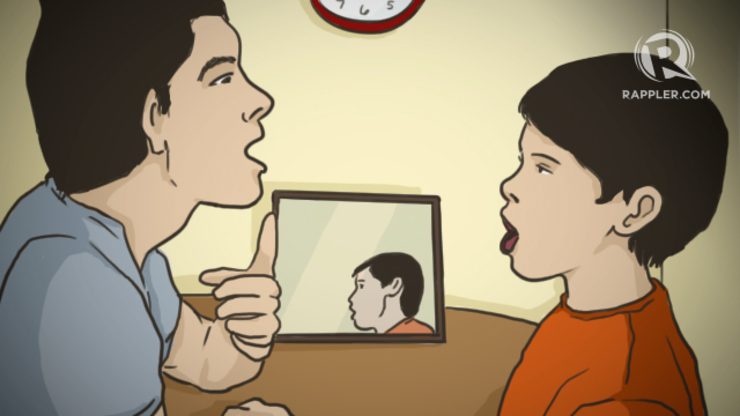SUMMARY
This is AI generated summarization, which may have errors. For context, always refer to the full article.

“Hi! My name is Ken, and I’m a Speech-Language Pathologist. I help people to talk.”
This is my go-to line for questions regarding what I do. Even if I’ve only been employed for two months so far, I already feel so attuned to the profession.
Speech-Language Pathology (SLP), also known as Speech-Language Therapy, is an allied medical profession directed towards repairing impaired communication to improve a person’s quality of life.
It includes the assessment, screening, diagnosis, treatment and prevention of difficulties relating to speech, language, hearing, fluency, voice, communication and swallowing.
Individuals, whether from the pediatric or the geriatric population, who have difficulties with the said areas, may benefit from the services of a speech-language pathologist.
Each day at work, I help kids who have either speech or language communication problems. These difficulties may stem from a learning disability, developmental delays, and neurological pathologies, among others.
I realized that society isn’t well informed regarding the available options for help.
Time bound
One of the fondest memories I have was working with a 4-year old boy with autism. When he was about 2 years old, her parents noticed that he had difficulties saying words or talking with other kids in the playground. He likes to look at bright lights and search for clocks.
He entered the clinic for the first time while clinging to his mom. During the first month of therapy, he was relatively aloof. There were a lot of crying, bargaining and anxiety. Despite these, the boy continued to surprise me.
I saw how he counted from one up to a thousand. I saw him solve puzzles that are difficult for his age, as well as learn some functional words for everyday use.
We still have a long way to go in terms of communication, but it’s only a matter of time before he improves.
His case is just one of the many that remind me on how rewarding the profession is.

Understanding perspectives
The constant planning for daily therapy sessions, the gruelling paperwork, and the 24-hour jolly persona required of a speech pathologist are just some of the challenges. Beyond that, a speech pathologist must see beyond stereotypes as he tries to understand each person’s condition.
In college, a mentor told me that one needs to constantly challenge one’s self in order to succeed in any field. He also told me that building relationships should be based on genuine human connection, not just some casual dialogue. You need to understand that you have to be a lot of things, but being a person is the most important.
It took a lot of energy to process everything at that time. But it takes even more energy to practice what she said.
Now that I’ve started working with these children, I started to advocate for their equal rights. I thrive to do my bit for humanity as I try to go an extra mile and be better.
As my kids would put it, let’s make the “awesome-est, biggest, hottest Volcano with a T-rex!” and not just some miniature mountain. .
Family support
As communication specialists, we constantly highlight the role families play in a person’s over-all development. Having the chance to work with courageous and supportive families made me appreciate this social role more. The drive to care was so desirable that its pursuit overrides every theory, stigma or value in people’s heads.
Likewise, there are support groups that share in the advocacy and fight for the noble cause of helping these people.
The Autism Society of the Philippines (ASP), the country’s largest non-profit organization dedicated to the well-being of persons with autism spectrum disorder, provides awareness seminars in the outskirts of the country.
Like ASP, the Down Syndrome Society and the Stroke Society of the Philippines are involved in raising awareness about Down syndrome and strokes respectively.
Hopeful
During the 2012 American Speech-Language- Hearing Association Convention, keynote speaker Maya Angelou roused the audience with a fiercely delivered motivational speech. The poet challenged the attendees to be “a rainbow in someone’s cloud.”
As a kid, Angelou was one of the people who ignited my love and appreciation for literature. Seeing how the words of a writer I admire bring light to my cherished profession inspired me. It was a reminder that everyone can be a champion for change. (READ: US poet Maya Angelou dies at 86)
Being that “rainbow” is like a therapy of sorts. It’s understanding people’s hues and shades while being able to articulate what they want to say or do. It’s a continuous process of learning between teacher and student. The desire and interaction, by which when ‘communication’ is deconstructed, makes for a wonderful act.
My kids bring so much happiness in my life. They made me see the world in a different light. But I know this pursuit for promoting communication is not going to be easy; but, I’m ready to face the future bright-eyed. – Rappler.com
Kenneth is a speech-language pathologist from the University of Santo Tomas’ pioneering batch. He is also a child advocate and blogs at SpechPlaythology.wordpress.com.
iSpeak is Rappler’s platform for sharing ideas, sparking discussions, and taking action! Share your iSpeak articles with us: move.ph@rappler.com.
Tell us what you think about this iSpeak article in the comments section below.
Add a comment
How does this make you feel?
There are no comments yet. Add your comment to start the conversation.